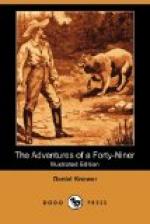One morning on the plaza I took a look into a gambling saloon. I saw a Greaser that had been betting against Monte all night, and had had wonderful luck. He announced that he would tap the bank for $1,800, which was more money than he ever had before, or could ever expect to have again, which meant that he would bet that amount for whatever sum the dealer could show to meet it on the turn of one card. He lost, and the dealer showed $1,800 in the bank and took all his money. Monte is the great National gambling game of Mexico, and his idea of Paradise is to be able to break a Monte bank.
Mr. B. from Kentucky, whom I took for so rich a nabob, referred to among the passengers when out of New York. I saw him take out his gold watch, a valuable one, and bet it behind the queen, on the game of Faro, for $100. He was evidently about broke. It won. Then he went the $200, and it won again. Then he went it the third time, and it won. In about twenty minutes he had his watch back and $700, then he left. Some one asked me a few months after that if I knew that he was worth $80,000? He had been very lucky, and that he was to run for sheriff of San Francisco county on the Democratic ticket, and that the Whigs had nominated Jack Hayes, the celebrated Texan ranger. Hayes had been in the Mexican war. It was told of him that when the American and Mexican armies were encamped opposite each other, that a Mexican officer, splendidly equipped, came forward on horseback, and challenged any American to meet him in single combat between the two forces. Jack Hayes volunteered to go, and he killed him. He took his horse, gold watch and personal effects. He afterward learned who he was, and that he left a widow. He sent all his personal effects to her as a present. Of course, we were interested warmly on his side, and he was elected. They say Colonel B. spent all his $80,000 on his side and was defeated. No reputable citizen of San Francisco or business man would allow himself to be seen betting at any of the public gambling tables. He would feel that he was losing character. I am trying to portray the scenes of those days exactly as they occurred, and if I left the gambling scenes out it would not be a true history.
At first public offices went a begging; nobody wanted them. Fine clothes were at a discount. He was looked upon as a tender-foot who knew nothing about the gold regions. But a flannel-shirted, roughly-dressed miner was the lion. He could tell something about the gold regions. The governor appointed a loafer fellow, in the early days, Port Warden. Nobody wanted it, and he was indorsed by one firm. As the city grew very rapidly the office soon became valuable. Somebody told the governor what kind of a man he had appointed Port Warden, and the governor wrote him a letter requesting him to resign, stating to him what representations had been made to him about his character, which, if he had known, he would not have appointed him. He wrote back to the governor refusing to resign, saying to him, he had better read the papers and look after his own character. The governor was up for re-election and the opposition papers were pitching into him.




